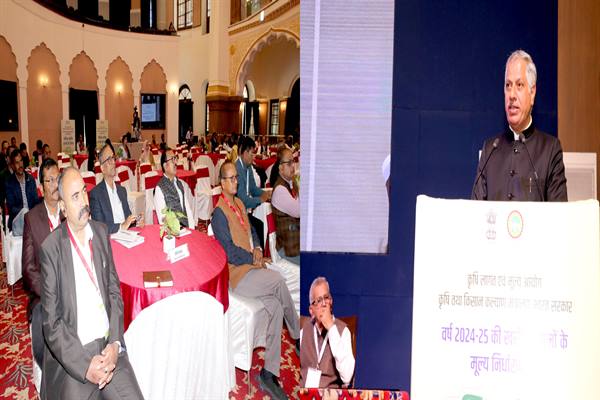
The Commission for Agricultural Costs and Prices, Union Ministry of Agriculture and Farmers Welfare with the member states from western India discussed in detail about deciding minimum support price for Kharif crops for the year 2024-25 at Kushabhau Thakre International Convention Centre in Bhopal.
Madhya Pradesh, Maharashtra, Gujarat, Rajasthan, Union Territory Dadra Nagar Haveli, Daman and Diu participated in the meeting.
The member States also held discussions on strengthening farmers’ committees, popularizing custom hiring centres, expanding area of millets in Rajasthan-Maharashtra and the strategic measures to become self-reliant in pulses production.
Chairman, Agricultural Costs and Prices Commission, Government of India, Vijaypal Sharma urged the stakeholders of the Commission, farmers, Government, traders to give recommendations to the Commission on a range of issues including assessment of import-export of Kharif crops, pulses and oilseeds, consumer demand, procurement, cost of production, research and support price.
Member Secretary, Agricultural Costs and Prices Commission, Shri Anupam Mitra asked the states to receive recommendations from the Commission for support prices for paddy, millet, maize, soybean, groundnut, jowar, pulses-oilseed crops and spice crops.
Commission member Shri Ratanlal Daga stressed on strengthening of procurement system, proper arrangement of irrigation as well as robust arrangements for marketing to reduce the cost prices.
Chairman Agricultural Costs and Prices Commission, Maharashtra, Pasha Patel recommended the proposed rates of minimum support price for various Kharif crops mainly soybean and cotton.
He informed about the difference by doing a comparative and factual analysis of the rates of different states.
He said that crops should be decided according to global warming and rainfall conditions.
The technical session was inaugurated by Additional Chief Secretary Farmers Welfare and Agricultural Development Madhya Pradesh Ashok Baranwal.
He informed Commission about irrigation, irrigation pumps, farm mechanization, and production of various crops.
He requested to extend the limit imposed by the Government of India on various agricultural produce in procurement.




